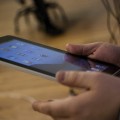From a user’s perspective there is not much difference between a smartphone and a tablet. Both devices are portable touch-screen computers, and while the a smartphone might have a dedicated dialing application by default, the ability to make voice calls or connect to a cellular network is not an exclusive feature. However, thanks to U.S. Copyright law the difference between an iPhone and an iPad is not just the screen size, it is the freedom to install software without a gatekeeper.
The Digital Millenium Copyright Act (DMCA), passed in 1998, banned [2] the circumvention of technology tailored to protect copyright. Due the the potential for these digital locks to prevent otherwise legal practices, such as transferring the music from CD to your computer, the DMCA instructed the U.S. Copyright office to consider exemptions to the law every three years.
In 2010, the last year that exemptions were published, the U.S. Copyright Office ruled (PDF) [3] that installing the software of your choice in your mobile device would be exempt from the DMCA. Jailbreaking and rooting, modifying the software of iOS and Android devices, respectively, to modify the operating system, delete unnecessary applications, or simply install applications that might not be available in the designated application stores, became officially legal.
This past October the U.S. Copyright Office issued the latest decision (PDF) [4] in this triennial rulemaking, extending the exemption for jailbreaking and rooting for smartphones but not expanding [5] the same freedom to tablet users. As a result two very similar devices with the same processor, operating system, and dedicated application store offer very different degrees of freedom.
The ruling also rolled back the freedom to circumvent digital locks in order to unlock a handset. In the United States wireless carriers often sell mobile devices that are restricted to operate on a limited number of wireless networks. This prevents users from taking their phone with them to another carrier or even using a different SIM card when traveling abroad. In 2006 the Copyright Office granted an exemption [6] allowing users to unlock their own device, an exemption that was extended in 2010. The most recent rule-making eliminated this exemption and starting in January 2013 users will technically violate copyright if they unlock their smartphone without their carriers’ permission.
Although the recent DCMA rulemaking primarily impacts U.S. users, the U.S. has actively pushed other countries to adopt restrictions against circumventing copyright protections including through trade agreements such as the Anti-Counterfeiting Trade Agreement [7], which was rejected [8] by the European Parliament but recently passed [9] in Japan. Similar language has also been included in the Trans-Pacific Partnership [10] (PDF [7]).
Combined, these efforts are a stark reminder on how copyright protections can extend beyond media and capture the basic freedoms of control over the devices we purchase and use.
